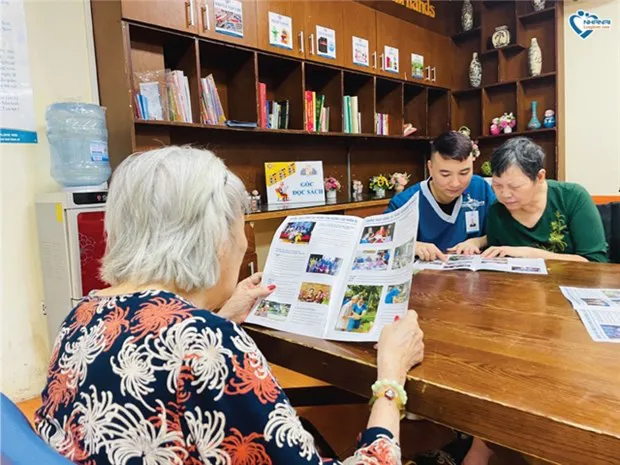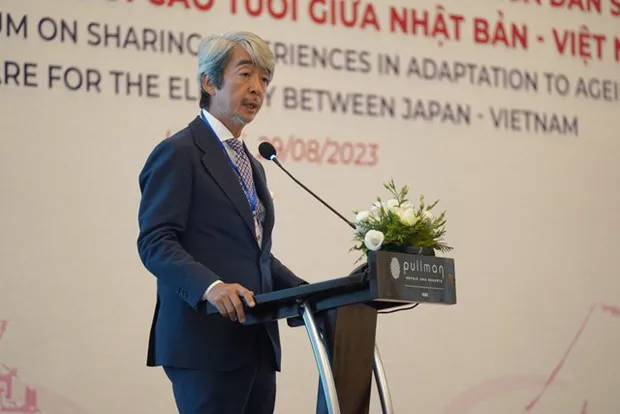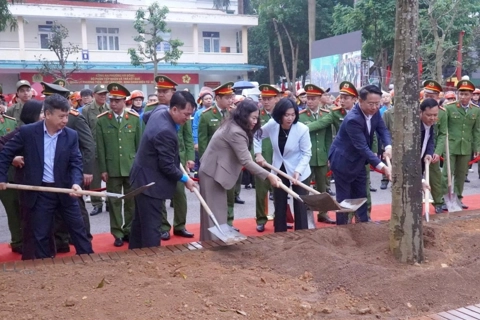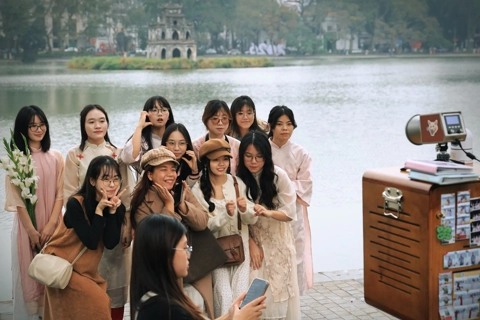Hanoi needs more specialized medical centers for elderly people
In Hanoi, there are estimated to be 250,000 people aged 75 and over who require significant social and medical support.
Hanoi needs more specialized medical centers for the elderly as the capital and Vietnam face a dramatic aging population on the horizon.
The information was provided at a workshop to exchange experiences on adapting to aging and caring for the elderly between Japan and Vietnam, held in Hanoi this week.
The workshop was organized by the General Office of Population and Family Planning under the Ministry of Health in cooperation with the Economic Research Institute for ASEAN and East Asia and Medical Excellence Japan.
Speaking at the workshop, Pham Vu Hoang, Deputy Director General of the General Office for Population and Family Planning, said that Vietnam began to enter the aging population phase in 2011, with the number of people aged 65 and above accounting for 7% of the total population. In 2021, the number of elderly people in Vietnam accounted for 8.3% of the total population (8.16 million elderly).
Elderly people are cared for at the Nhan Ai Nursing Center in Hanoi. Photo courtesy of the center |
It is also projected that the number of elderly people in Vietnam will increase to 16.8 million in 2039 and 25.2 million in 2069. Vietnam will enter a period of population aging from 2036, when the proportion of the population aged 65 and over will account for 14.2% of the total population.
"Vietnamese today have an average life expectancy of 73.6 years. Vietnamese women are living longer than men. Vietnam is one of the fastest aging nations in the world, as the demographic transition to an aging population will take about 25 years," Hoang said.
He emphasized that the aging population poses severe challenges in economic growth, social security, labor, infrastructure planning, and especially health care.
Specifically for Hanoi, Dr. Ho Thi Kim Thanh of the Department of Family Medicine at Hanoi Medical University said the capital city has about 250,000 people aged 75 and older who require much social and medical support.
"On average, elderly people suffer from 3 to 4 diseases, mostly non-communicable diseases. Meanwhile, few medical services can provide treatment and long-term care for the elderly. It is estimated that Hanoi needs at least 10 hospitals, geriatric departments and specialized geriatric medical centers to care for the elderly," Thanh said.
She noted that Japan has a super-aged population, with 36.2 million people aged 65 and over in 2022, accounting for 29% of the total population.
"However, Japan has a lot of experience in responding to an aging society, such as restructuring the health care system and geriatric care, building and managing elderly care facilities, and establishing institutions for social security policy, labor, and infrastructure design. Japan's experiences are valuable lessons for Vietnam to proactively adapt to population aging," Thanh added.
Lessons from Japan
Japan is a typical country with a lot of experience in adapting to an aging society. Dr. Kenji Shibuya, a representative of Medical Excellence Japan, said that health crises, gaps in digital technology, and other global threats are affecting communities.
Dr. Kenji Shibuya, a representative of Medical Excellence Japan, speaks at the workshop. Photo: VNA |
He added that Japan has introduced many policies to deal with an aging society in the past, but they have failed. "However, the community-building approach has succeeded," Shibuya said.
In addition, population health research experts from Japan and Vietnam discussed project ideas for an aging society, calling on stakeholders to work together to build a healthy aging community in Vietnam.
Market potential of services for the elderly
According to the Vietnam Chamber of Commerce and Industry's (VCCI) Elderly Care Service Market Outlook Report, Vietnam is a promising market for elderly care services, with 20 million potential clients by 2035.
The growing demand and more diversified needs of the elderly present numerous opportunities for domestic and foreign businesses and investors in Vietnam, the report said.
It estimates that the elderly care market in Vietnam will grow at an annual rate of up to 7% from 2020 to 2027. "In the Asia-Pacific region, the rate was expected to be between 7.7% and 14.6% from 2018 to 2022, with a total value of up to US$2 trillion," the report said.
Vietnam's population is aging rapidly due to mortality and fertility decline. The country's Ministry of Labor, Invalids and Social Affairs estimates that the number of elderly people requiring daily care will increase to about 10 million by 2030.
According to the report, residential facilities with care services for the elderly are largely untapped in Vietnam, although there are a growing number of private offerings.
Of the country's 63 provinces, only 32 have specialized facilities for the elderly. The Vietnamese government aims to have at least one facility in every province by 2025.













